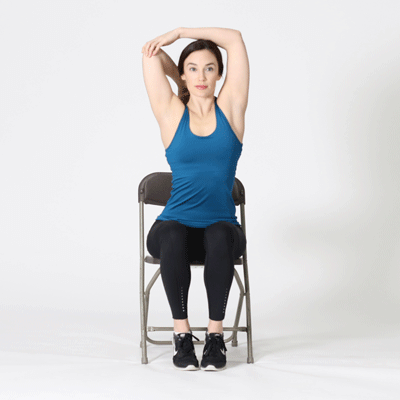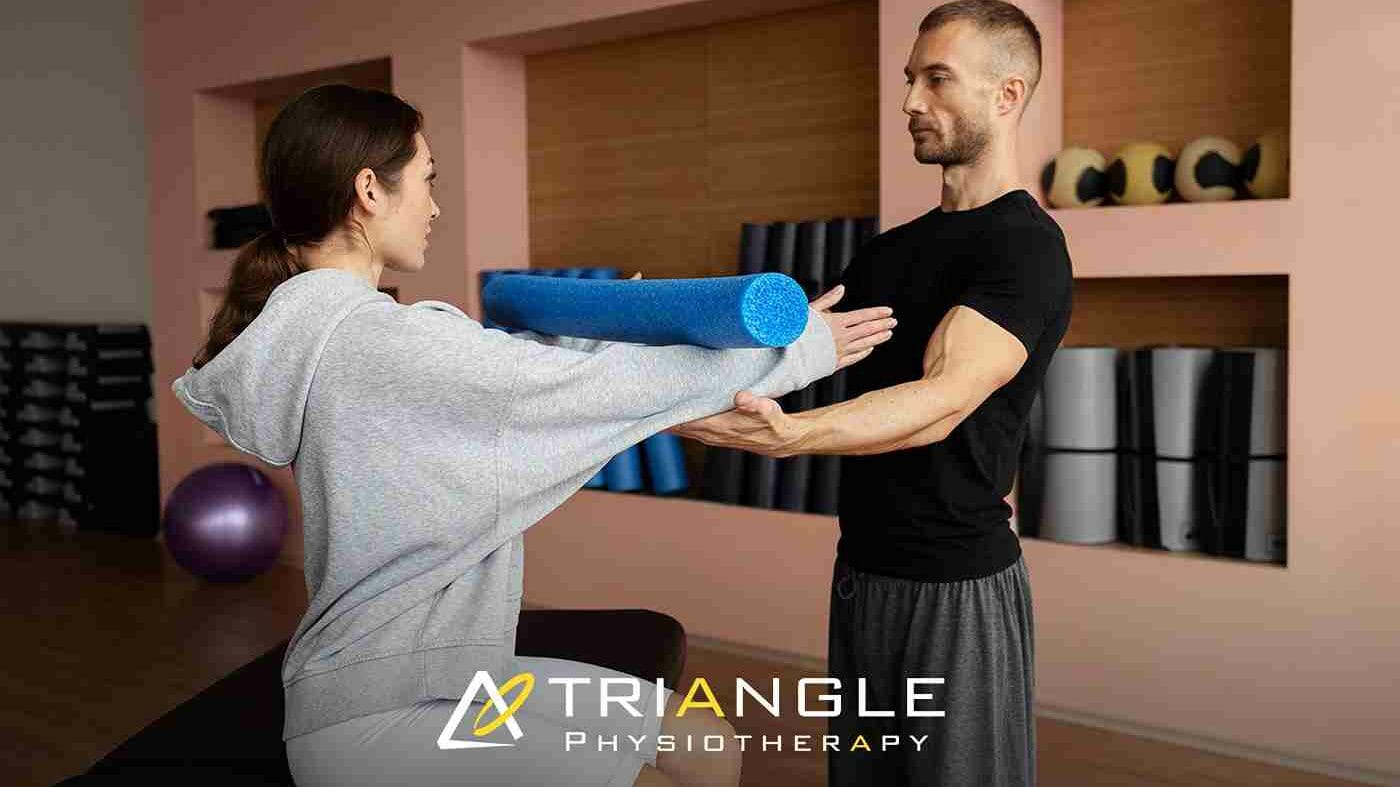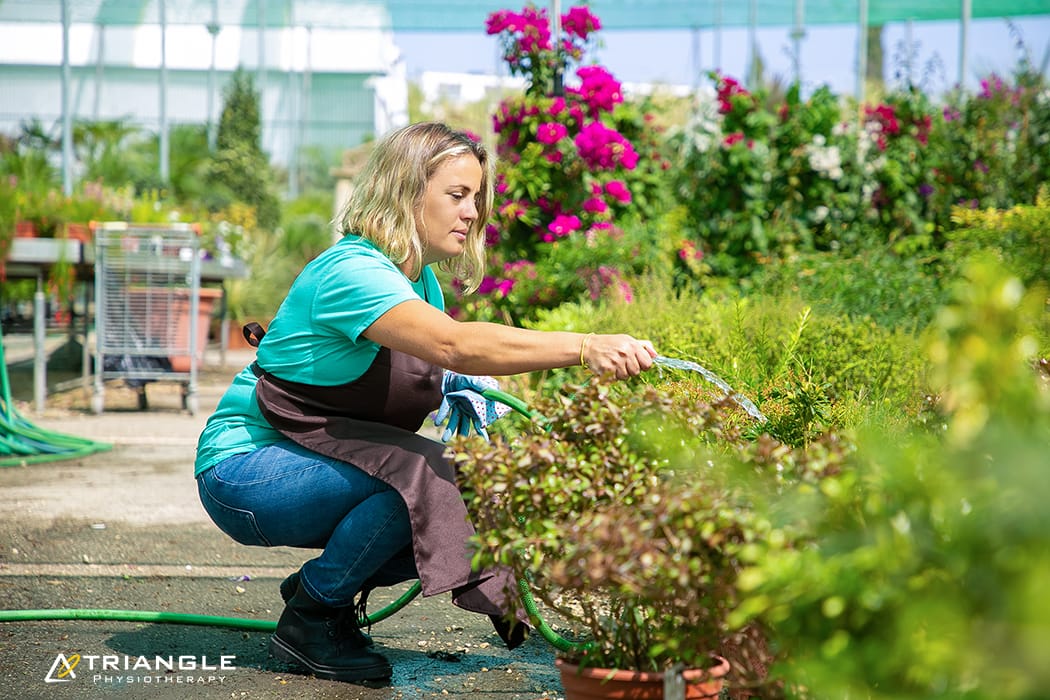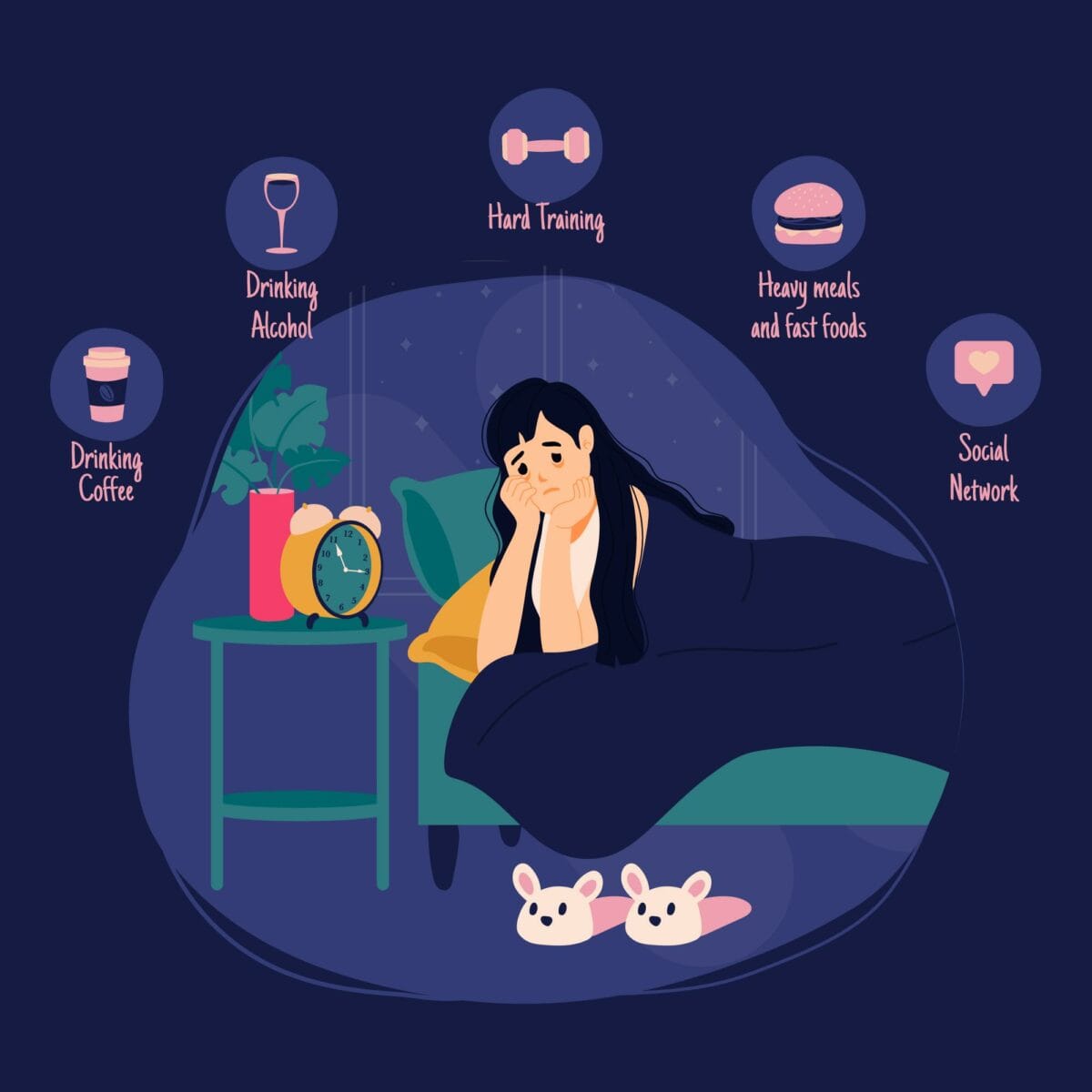Working and studying from home can take a toll on your body and mind, making it crucial to incorporate some daily movement. Simple actions like walking around your workspace while on a call or standing up while having a snack can help reduce sedentary behavior. Additionally, daily stretching can prevent issues such as “tech neck” and back pain.
How often should you stretch working from home?
When working from home, it’s beneficial to stretch regularly to prevent stiffness and discomfort. Here are some general recommendations:
- Every 30-60 Minutes: Aim to take a short break to stand up, move around, and do some stretches. This helps prevent prolonged periods of inactivity and reduces the risk of musculoskeletal issues.
- Mini Breaks: Take a few minutes every hour to do some simple stretches or walk around. This can help improve circulation and reduce muscle tension.
- Daily Stretching Routine: Incorporate a more comprehensive stretching routine at least once a day, focusing on areas prone to tension such as the neck, shoulders, back, and hips.
By following these guidelines, you can maintain flexibility, reduce the risk of pain, and improve overall well-being while working from home.
What stretches can I do at my desk?
Tricep Stretch

Neck Stretch

Upper Body and Arm Stretch

Trunk Rotation Stretch

Shoulder Shrug Stretch

Stretch Courtesy: https://uwaterloo.ca/campus-wellness/blog/post/desk-stretches
If you are experiencing persistent neck pain, back pain or discomfort, it is advisable to consult a physiotherapist, for proper evaluation and guidance.
Click here to book an appointment with a physiotherapist at one of our eight locations.
- Physiotherapy Etobicoke – Triangle Physiotherapy Etobicoke
- Oakville Physiotherapy Clinic – Triangle Physiotherapy Oakville
- Physiotherapy North York – Triangle Physiotherapy North York
- Mississauga Physiotherapy Clinics – Triangle Physiotherapy Mississauga
- Downtown Physiotherapy Clinics – Triangle Physiotherapy King West
- Uptown Physiotherapy Clinics – Triangle Physiotherapy Lawrence Park
- Physiotherapy Clinic Downtown Toronto – Triangle Physiotherapy Queens Quay
- Physiotherapy Clinics Mississauga – Triangle Physiotherapy Erin Mills
Incorporating simple stretches into your routine can help reduce back pain when working from home. For personalized guidance, you can seek physiotherapy in Etobicoke, Oakville, North York, Toronto, Lawrence Park, Queens Quay, Erin Mills, Mississauga, or Liberty Village, where experienced physiotherapists can create a tailored plan to support your back health and overall well-being.
Embracing a New Journey to Wellness
Are you looking to transform your wellness and discover a better version of yourself? Physiotherapy may be the key to unlocking your full potential. In Oakville, there are numerous physiotherapy clinics and centers that offer a range of services to help you improve your physical health and well-being. Whether you’re recovering from an injury, managing a chronic condition, or simply looking to enhance your overall wellness, a skilled physiotherapist in Oakville can guide you on your journey. Let’s explore how Triangle physiotherapy in Oakville can benefit you and lead you towards a healthier, happier lifestyle.
The Power of Physiotherapy in Transforming Your Life
Embracing physiotherapy in Oakville can truly be a transformative experience for you. Imagine a life where pain and limitations are gradually replaced by strength, flexibility, and vitality. Through personalized treatment plans and expert guidance, physiotherapy has the power to restore your body’s natural balance and function. Each session brings you closer to feeling your best self, both physically and mentally. As you embark on this journey towards better wellness, trust in the process and believe in your ability to overcome obstacles. Remember, every step you take in physiotherapy is a step towards a brighter, healthier future filled with endless possibilities. Stay committed and hopeful, for the best version of yourself is within reach.
Unleashing Your Full Potential with Personalized Care
In Oakville, physiotherapy offers more than just a treatment plan – it provides you with personalized care that unleashes your full potential. From tailored exercises to targeted interventions, every aspect of your therapy is designed to help you achieve your wellness goals. By committing to this journey, you are opening the door to a world where your body can thrive and excel beyond its current limitations. Embrace the process with an open mind and a heart full of hope, knowing that each session is a step towards unlocking your true capabilities. With the support of dedicated physiotherapists in Oakville, you are on the path to discovering a better you – one that is strong, resilient, and ready to shine. Trust in the journey and believe in the transformative power of personalized care. Your best self awaits.

Finding Relief and Balance in Your Everyday Life
As you embark on your wellness journey with physiotherapy in Oakville, remember that each step you take towards self-improvement is an investment in your future well-being. In the midst of life’s challenges and demands, finding relief and balance through physiotherapy can be a beacon of hope. Your dedicated physiotherapists are not just guides; they are companions on this path to a better you. Together, you will discover the power of resilience and strength within yourself, paving the way for a life filled with vitality and joy. Embrace the daily practices and exercises with gratitude, knowing that each moment brings you closer to achieving harmony in your mind, body, and spirit. Your journey to holistic wellness begins now.
Building a Supportive Community for Your Wellness Goals
Surrounding yourself with a supportive community can significantly boost your wellness journey. In Oakville, embrace the opportunity to connect with like-minded individuals who share your aspirations for a healthier lifestyle. By sharing experiences, motivation, and insights, you can create a network of encouragement that propels you forward. Attend group sessions, workshops, or join online forums to cultivate relationships that foster growth and inspiration. Together, you can celebrate victories, overcome challenges, and uplift each other towards a better you. Remember, a strong support system not only amplifies your achievements but also reinforces your commitment to long-term wellness. Let’s build a community that nurtures our well-being and empowers us to thrive.
Celebrating Your Progress and Achievements
As you embark on your wellness journey in Oakville, don’t forget to take time to acknowledge and celebrate every step forward. Whether it’s reaching a fitness milestone, mastering a new physiotherapy exercise, or simply showing up consistently for your sessions, each achievement deserves recognition. By celebrating your progress, you not only boost your confidence and motivation but also reinforce the positive habits you’re developing. Take pride in how far you’ve come and use it as fuel to propel yourself even further. Remember, every small victory is a significant step towards a better you. Embrace the journey with gratitude and joy, knowing that each moment of progress brings you closer to your overall wellness goals. Let’s celebrate our wins together and continue striving for a healthier, happier life in Oakville.
Your Wellness Transformation Awaits: Take the First Step Today!
As you continue on your path to wellness in Oakville, remember that your journey is unique and significant. Each day offers new opportunities for growth and progress, no matter how small they may seem. Embrace each moment with optimism and a hopeful spirit, knowing that every step you take brings you closer to a better version of yourself. By taking that first step towards physiotherapy and committing to your well-being, you are already on the right track to achieving your goals. Trust in the process, believe in yourself, and let hope guide you towards a healthier, happier you. The power to transform your wellness lies within you – seize it and embark on this rewarding journey with confidence and determination.
Transforming your wellness with physiotherapy can lead to a healthier and more active life. Whether you are looking for physiotherapy in Etobicoke, Oakville, North York, Toronto, Lawrence Park, Queens Quay, Erin Mills, Mississauga, or Liberty Village, there are dedicated professionals ready to help you achieve your health goals and discover a better you.
Physiotherapy is a crucial aspect of maintaining optimal health and wellbeing, especially in a fast-paced society where injuries and chronic pain are all too common. In Oakville, physiotherapy plays a key role in helping individuals recover from injuries, manage pain, and improve overall physical function. Whether you are recovering from a sports injury, dealing with chronic pain, or simply looking to enhance your quality of life, Oakville physiotherapy offers a range of specialized treatments tailored to your specific needs. Keep reading to discover how Oakville physiotherapy can be your key to lasting health and wellbeing.
The benefits of physiotherapy for long-term health and wellness
Physiotherapy not only addresses immediate concerns but also promotes long-term health and wellness. Through personalized treatment plans, physiotherapists in Oakville focus on strengthening muscles, improving flexibility, and enhancing mobility to prevent future injuries and maintain optimal physical function. In addition to physical benefits, physiotherapy helps individuals manage stress, improve mental well-being, and enhance overall quality of life. By taking a proactive approach to health and wellness through regular physiotherapy sessions, individuals can enjoy a higher quality of life and reduce the risk of developing chronic conditions in the long run. Stay tuned to learn more about the specific ways Oakville physiotherapy can support your long-term health and wellbeing.
What sets Oakville Physiotherapy apart
Oakville Physiotherapy stands out for its comprehensive approach to health and wellbeing. With a team of highly skilled and experienced physiotherapists, they tailor each treatment plan to meet the unique needs of every individual. What sets Oakville Physiotherapy apart is their commitment to ongoing education and staying updated on the latest techniques and advancements in the field. By focusing on empowering their clients with knowledge and tools for self-care, Oakville Physiotherapy ensures long-lasting results and a holistic approach to overall wellness. Experience the difference with Oakville Physiotherapy and unlock your full potential for lasting health and wellbeing.
Services offered at Oakville Physiotherapy
At Oakville Physiotherapy, a wide range of services is available to address various health and wellness needs. From physiotherapy treatments for post-injury rehabilitation to specialized programs for chronic pain management, their expert team provides personalized care for each patient. Additionally, Oakville Physiotherapy offers services such as acupuncture, massage therapy, and custom orthotics to complement their physiotherapy treatments. With a focus on individualized care and holistic wellness, Oakville Physiotherapy ensures that every client receives the comprehensive support they need to achieve lasting health and wellbeing. Stay tuned to discover how these services can benefit you on your journey to optimal health.
Meet the team of experienced physiotherapists
The dedicated team at Oakville Physiotherapy comprises highly skilled and experienced physiotherapists committed to providing top-notch care for all patients. With specialized training in various areas such as sports injuries, post-surgical rehabilitation, and chronic pain management, each team member brings a wealth of knowledge and expertise to the table. Their patient-centered approach ensures that every individual receives tailored treatments and support to address their unique health needs. Whether you are recovering from an injury or seeking to enhance your overall wellbeing, you can trust the Oakville Physiotherapy team to guide you on your journey to lasting health and vitality. Stay tuned to learn more about our team members and the exceptional care they provide.
Client testimonials and success stories
Discover firsthand accounts of the transformative impact Oakville Physiotherapy has had on the lives of our clients. From overcoming debilitating injuries to regaining mobility and strength, our patients share their inspiring journeys towards improved health and wellbeing. These testimonials highlight the personalized care and dedication our team provides, showcasing the positive outcomes achievable through physiotherapy. Stay tuned to be inspired by real-life success stories that demonstrate the profound difference Oakville Physiotherapy can make in your life.
Take control of your health with Oakville Physiotherapy
Empower yourself to prioritize your health and wellbeing by partnering with our skilled physiotherapy team. With a focus on personalized care and evidence-based practices, Oakville Physiotherapy offers you the tools and support you need to achieve lasting results. Whether you are recovering from an injury, managing a chronic condition, or simply striving to enhance your physical performance, our tailored treatment plans can help you reach your goals. Invest in your health today and experience the transformative benefits of Oakville Physiotherapy. Stay tuned for expert tips on how to maximize your physiotherapy experience and optimize your journey to lasting health and wellbeing.
Conclusion: Invest in your health with Oakville Physiotherapy
In conclusion, prioritizing your health through Oakville Physiotherapy is an investment in your overall wellbeing. By entrusting yourself to our experienced team, you are taking proactive steps towards achieving long-lasting health benefits. Our personalized treatment plans, rooted in evidence-based practices, are designed to address your specific needs and goals effectively. As you embark on this journey with us, remember that your commitment to your health is a vital component in maximizing the outcomes of your physiotherapy experience. Embrace the opportunity to enhance your physical well-being with Oakville Physiotherapy and unlock the true potential of your health. Stay dedicated, stay motivated, and experience the positive impact it can have on your life.
“Achieving lasting health and well-being is possible with the right physiotherapy care. Triangle Physiotherapy offers expert services across the GTA, including Physiotherapy in Etobicoke, Oakville, North York, Toronto, Lawrence Park, Queens Quay, Erin Mills, Mississauga, and Liberty Village. Our dedicated team is here to support your journey towards a healthier life.”
Gardening is a deeply rewarding hobby, but for many enthusiasts, it can also be a source of physical discomfort and pain. From sore backs to achy knees, the joys of gardening can sometimes be overshadowed by the strain it puts on our bodies. However, with the right techniques and precautions, it’s possible to enjoy gardening without the pain. In this blog post, we’ll explore some helpful tips and tricks to make your gardening experience as enjoyable and pain-free as possible.
Proper Body Mechanics
One of the most important aspects of pain-free gardening is practicing proper body mechanics. This means using correct posture and techniques to minimize strain on your muscles and joints. Here are a few key tips:
- Bend at the knees, not at the waist, when lifting heavy objects such as bags of soil or pots.
- Use ergonomic gardening tools with padded handles to reduce strain on your hands and wrists.
- Take frequent breaks and avoid staying in one position for too long to prevent stiffness and discomfort.
Warm-up
Just like any other physical activity, gardening can benefit from a proper warm-up routine. Before diving into your gardening tasks, take a few minutes to stretch your muscles and loosen up your joints. Simple exercises like arm circles, leg swings, and back stretches can help prepare your body for the work ahead and reduce the risk of injury.
Choose the Right Tools
Investing in the right gardening tools can make a world of difference when it comes to preventing pain and discomfort. Look for tools that are lightweight, ergonomic, and designed to reduce strain on your body. Long-handled tools can help you avoid bending over excessively, while padded kneelers can protect your knees during tasks like planting and weeding.
Break Tasks into Manageable Chunks
Instead of trying to tackle your entire garden in one marathon session, break your gardening tasks into smaller, more manageable chunks. Spread out your work over several days or weeks to give your body time to rest and recover between sessions. Not only will this approach help prevent pain and fatigue, but it will also allow you to enjoy your time in the garden without feeling overwhelmed.
Embrace Container Gardening
If you struggle with mobility issues or have limited space, container gardening can be a fantastic alternative to traditional gardening. By planting in pots and containers, you can bring the joys of gardening right to your doorstep without the need for bending, kneeling, or heavy lifting. Plus, container gardening allows for greater flexibility and creativity in your garden design.

How do I book an appointment with a Physiotherapist near me?
Click HERE to book an appointment with a physiotherapist or chiropractor at one of our eight locations.
- Physiotherapy Etobicoke – Triangle Physiotherapy Etobicoke
- Oakville Physiotherapy Clinic – Triangle Physiotherapy Oakville
- Physiotherapy North York – Triangle Physiotherapy North York
- Mississauga Physiotherapy Clinics – Triangle Physiotherapy Mississauga
- Downtown Physiotherapy Clinics – Triangle Physiotherapy King West
- Uptown Physiotherapy Clinics – Triangle Physiotherapy Lawrence Park
- Physiotherapy Clinic Downtown Toronto – Triangle Physiotherapy Queens Quay
- Physiotherapy Clinics Mississauga – Triangle Physiotherapy Erin Mills
Gardening can be a joyful activity without the burden of pain, especially with the right guidance and exercises. If you’re experiencing discomfort, consider seeking physiotherapy in Etobicoke, Oakville, North York, Toronto, Lawrence Park, Queens Quay, Erin Mills, Mississauga, or Liberty Village. Expert physiotherapists in these areas can help you manage pain and improve your strength, so you can enjoy gardening pain-free.
Sleep plays a crucial role in promoting overall health and well-being. It is a fundamental physiological process that is essential for various functions in the body.
Healthy bedtime habits can make a big difference in your quality of life. Having healthy sleep
habits is often referred to as having good “sleep hygiene.”
Why is sleep important?
Sleep is critical to many of our body systems, including:
- Optimal immune function
- Tissue healing
- Cardiovascular health
- Cognitive function, learning, and memory.
What are the effects of inadequate sleep?

The effects of not sleeping well are:
- Increased pain perception
- Reduced quality of life
- Loss of optimal function
- Anxiety and depression
- Lack of attention
- Impaired memory
- Increased risk of accidents, falls, and other injuries
- Some studies have also indicated sleep disorders may be a risk factor for cancer.
What is Sleep Hygiene?
Having healthy sleep habits is also known as having good “Sleep Hygiene”. Here are some tips on creating good sleep hygiene:
- Try to stick to a sleeping schedule – have a consistent bedtime and wake-up time.
- Have a bedtime ritual that involves a relaxing routine like a skincare routine, listening to relaxing music, or reading a few pages of a book.
- Avoid being on electronics closer to bedtime.
- Exercise every day.
- Avoid naps during the day.
- Ensure your mattress and pillows are comfortable.
- Avoid eating heavy meals 2-3 hours before bedtime. Avoiding alcohol, caffeine, and cigarettes also helps.
- Evaluate your room, eliminate bright lights, and make sure the temperature is set to your comfort level.
- If your partner snores, get a pair of earplugs. If a window has a sliver of bright light that bothers you, consider getting a sleep mask.
What does physiotherapy have to do with sleep?
Physiotherapists are advocates for prevention and health promotion. They have a wealth of information to educate their patients on living a healthy lifestyle and improving their quality of life. Physiotherapists can also help with:
- Pain Management: Individuals with chronic pain conditions, such as back pain, neck pain, or joint pain, may experience difficulty sleeping. Physiotherapy interventions, such as exercises, stretches, and manual therapy, can help manage and alleviate pain, promoting better sleep.
- Posture and Alignment: Poor posture or musculoskeletal misalignments can contribute to discomfort during sleep. Physiotherapists can assess and address postural issues, providing exercises and interventions to improve alignment and reduce pain, potentially enhancing sleep quality.
- Muscle Tension and Relaxation: Physiotherapy techniques, such as massage, stretching, and relaxation exercises, can help reduce muscle tension. Individuals who experience muscle stiffness or tension-related sleep disturbances may benefit from physiotherapy interventions aimed at promoting relaxation.
- Respiratory Function: Some physiotherapy techniques focus on respiratory function and breathing exercises. Improving respiratory function can contribute to better oxygenation and may have positive effects on sleep quality, especially for individuals with conditions like sleep apnea.
- Exercise and Physical Activity: Regular physical activity, prescribed and guided by a physiotherapist, has been linked to improved sleep. Exercise can contribute to overall well-being, reduce stress, and enhance sleep duration and quality.
- Sleep Posture and Ergonomics: Physiotherapists can guideon proper sleep posture and ergonomic considerations. This may include recommendations for pillows, mattresses, and sleep positions that support musculoskeletal health and minimize discomfort.
- Stress Reduction: Physiotherapy interventions often include stress management techniques. Stress and anxiety can negatively impact sleep, so addressing these factors through physiotherapy may indirectly contribute to improved sleep.
How do I book an appointment with a Physiotherapist near me?
Click HERE to book an appointment with a physiotherapist or chiropractor at one of our eight locations.
- Physiotherapy Etobicoke – Triangle Physiotherapy Etobicoke
- Oakville Physiotherapy Clinic – Triangle Physiotherapy Oakville
- Physiotherapy North York – Triangle Physiotherapy North York
- Mississauga Physiotherapy Clinics – Triangle Physiotherapy Mississauga
- Downtown Physiotherapy Clinics – Triangle Physiotherapy King West
- Uptown Physiotherapy Clinics – Triangle Physiotherapy Lawrence Park
- Physiotherapy Clinic Downtown Toronto – Triangle Physiotherapy Queens Quay
- Physiotherapy Clinics Mississauga – Triangle Physiotherapy Erin Mills
“Good sleep is essential for overall well-being, and addressing physical discomfort can significantly improve sleep quality. Triangle Physiotherapy offers expert services across the GTA, including Physiotherapy in Etobicoke, Oakville, North York, Toronto, Lawrence Park, Queens Quay, Erin Mills, Mississauga, and Liberty Village. Our skilled physiotherapists can help you manage pain and improve your sleep, contributing to better overall health.”






